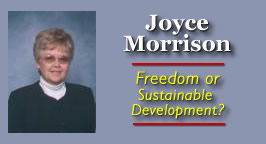Other
Morrison
Articles:
Enviros Attacking Rural Property Through Septic Systems
Taking Your Land For Private Developers
ARE YOU "LISTENING?," YOUR PROPERTY RIGHTS ARE FADING AWAY
Joyce
Morrison
September 2, 2006
NewsWithViews.com
Sometimes red flags jump up when you read an article and you know �something� isn�t quite right. But when red flags wave, bells ring and funny little things jump up and down, you know that �something� is really trying to get your attention.
That is exactly what happened when I read about �Cooperative Conservation.� It reeked of the feeling one has when mean little kids would visit and your mother would say, �Be nice - and share.� You knew those kids could care less about how hard you had worked to get your �things� and how carefully you cared for them. After those kids got hold of them, they would still be yours � but your property would never be same. These intruders now had a stake in them.
Apparently the president felt there should be some sharing. On August 26, 2004, he issued an Executive Order on the �Facilitation of Cooperative Conservation.�
The Executive Order basically says �everyone must play together and if it is yours � you have to share.� Thousands of people will be involved in the �resources� on your property and you did not invite them to play with you, yet they will all have a stake in your sweat equity.
The Secretaries of Interior, Commerce and Agriculture, the Administrator of the Environmental Protection Agency, and the Chairman of the White House Council on Environmental Quality have listed the dates and locations of the listening sessions on cooperative conservation and environmental partnerships.
The release said, �The listening sessions will give citizens an opportunity to exchange ideas on incentives, partnership programs and regulations that can improve results and promote cooperative conservation and environmental partnerships.�
Issues that will be �listened to� at these sessions are:
-
How can the federal government enhance wildlife habitat, species protection, and other conservation outcomes through regulatory and voluntary conservation programs?
-
How can the federal government enhance cooperation among federal agencies and with states, tribes, and local communities in the application of environmental protection and conservation laws?
-
How can the federal government work with states, tribes, and other public- and private-sector partners to improve science used in environmental protection and conservation?
-
How can the federal government work cooperatively with businesses and landowners to protect the environment and promote conservation?
-
How can the federal government better respect the interests of people with ownership in land, water, and other natural resources?
�I�m from the government and I�m here to help you,� rings loud and clear.
In August 2005, by invitation only, 1300 representatives from environmental groups, government agencies, business entities and a handful of landowners attended a three day conference in St. Louis, MO on cooperative conservation.
The least represented and the persons who have the most at stake are the farmers. Cooperative conservation will be using the �tools of the Farm Bill,� and farmers have the most property the stakeholders want to �share.� There are a few organizations that supposedly represent farmers, but most farm organization representatives attending the meetings are personnel who have never had dirt under their fingernails.
The Non-Governmental Organizations (NGOs) were highly represented at the meeting in St. Louis. The role the NGOs will play in cooperative conservation sounds very familiar to United Nations Agenda 21�s definition of NGOs working with Federal, state and local governments. Keep in mind, you do not elect the officials at The Nature Conservancy, Ducks Unlimited, Sierra Club, and other NGOs, but they will all be partners with the government in the private-public partnerships�..regulating YOUR property. [Must see DVD: "Liberty or Sustainable Development"]
The United Nations Habitat 1 held in Vancouver in 1976 - Preamble of Agenda Item 10 states:
�Land�cannot be treated as an ordinary asset, controlled by individuals and subject to the pressures and inefficiencies of the market�. The provision of decent dwellings and healthy conditions for the people can only be achieved if land is used in the interests of society as a whole. Public control of land use is therefore indispensable�Governments must maintain full jurisdiction and exercise complete sovereignty over such land�Change in the use of land should be subject to public control and regulation�of the common good.�
Illinois River Conservation Reserve Enhancement Program (CREP) is a cooperation conservation case study. In Illinois, the �key partners long the Illinois River are USDA Farm Service Agency, USDA Natural Resources Conservation Service, Illinois Department of Agriculture, Illinois Department of Environmental Protection, Illinois Department of Natural Resources, Illinois Farm Bureau, Illinois conservation districts, Ducks Unlimited, The Nature Conservancy, and farm producers.�
Note how the farm producers are the last partner mentioned. Does this sound like Habitat I? How much do you think it costs per meeting for these agencies and NGOs to decide what to do about your property?
Few farmers have wealth in their pocket. They spend their lives worrying if the crops will make the farm payment and how they can keep ahead of the operating expenses. But there is no more pride to be felt than a farmer farming his own land. Is this privilege �and right -- about to be taken from the farmer who raises our food? Will he be replaced by ducks and weeds?
�The Nature Conservancy is assessing best management practices in the CREP project area to quantify the environmental benefits of these practices,� according to their project summary. The contact for the project is the Illinois State Director of The Nature Conservancy.
Where are our elected officials?
The American Heritage Rivers Initiative falls under cooperative conservation. These are rivers named by former President Bill Clinton. This initiative left the opening for severe restrictions in the Heritage Rivers� watersheds. Public opposition prevented a number of rivers from getting on his list.
Time to re-establish a property rights ethic, an article by Duggan Flanakin for Eco-logic states, �We are in danger of abandoning our founding principles, and suborning our own future prosperity to an alien philosophy which, under the guise of group rights concentrates power in the hands of elites.�
Conservation easements are used in �cooperative conservation.� On August 17 a press release stated �Today, President Bush signed a measure into law that will aid the protection of thousands of acres of the nation�s shrinking agricultural lands. Congressman Mike Thompson (D-CA) spearheaded efforts to create the new tax provision. It will increase deductions available to farmers, ranchers and other landowners who donate their property for conservation easements.�
It is ironic there is such a push to take farmland out of production to be used for wetlands, CREP, CRP, conservation easements and other programs and yet millions of dollars are spent on projects to prevent sprawl and conservation in the name of saving our land for agriculture.
At a meeting this month, Illinois Congressmen John Shimkus and Ray LaHood both said they had never heard of the cooperative conservation program. Apparently congress has not been fully informed of this vast production to be performed by the government bureaus (bureaucrats) and the NGOs.
|
Subscribe to the NewsWithViews Daily News Alerts! |
If
this is truly a democracy, why have unelected officials in the government
bureaus (bureaucrats) and the NGOs been given so much power to rule
over the people while spending our tax dollars? Could this be taxation
without representation?
� 2006 Joyce Morrison
- All Rights Reserved
Joyce Morrison attempts to educate the public regarding the dangers coming to their local communities through Sustainable Development and Agenda 21 programs which are designed to gradually take control of all private property through undue regulations.
Morrison writes for Eco-logic Powerhouse, NewsWithViews.com, Range Magazine, SOWER magazine as well as numerous other publications. She is a weekly participant on the teleconference of the Illinois Policy Institute, a conservative think tank and is a pro-life, pro-family activist.
She is a chapter leader for Concerned Women for America as well as Secretary to the Board of Directors of Rural Restoration/ADOPT Mission, a national farm ministry located in Sikeston, MO. FarmersRuralRestoration.com. Her most enjoyable time is spent teaching a senior adult Sunday School class which is a focus on hope and encouragement.
E-Mail: dayspring365@yahoo.com
The Non-Governmental Organizations (NGOs) were highly represented at the meeting in St. Louis. The role the NGOs will play in cooperative conservation sounds very familiar to United Nations Agenda 21�s definition of NGOs working with Federal, state and local governments.











